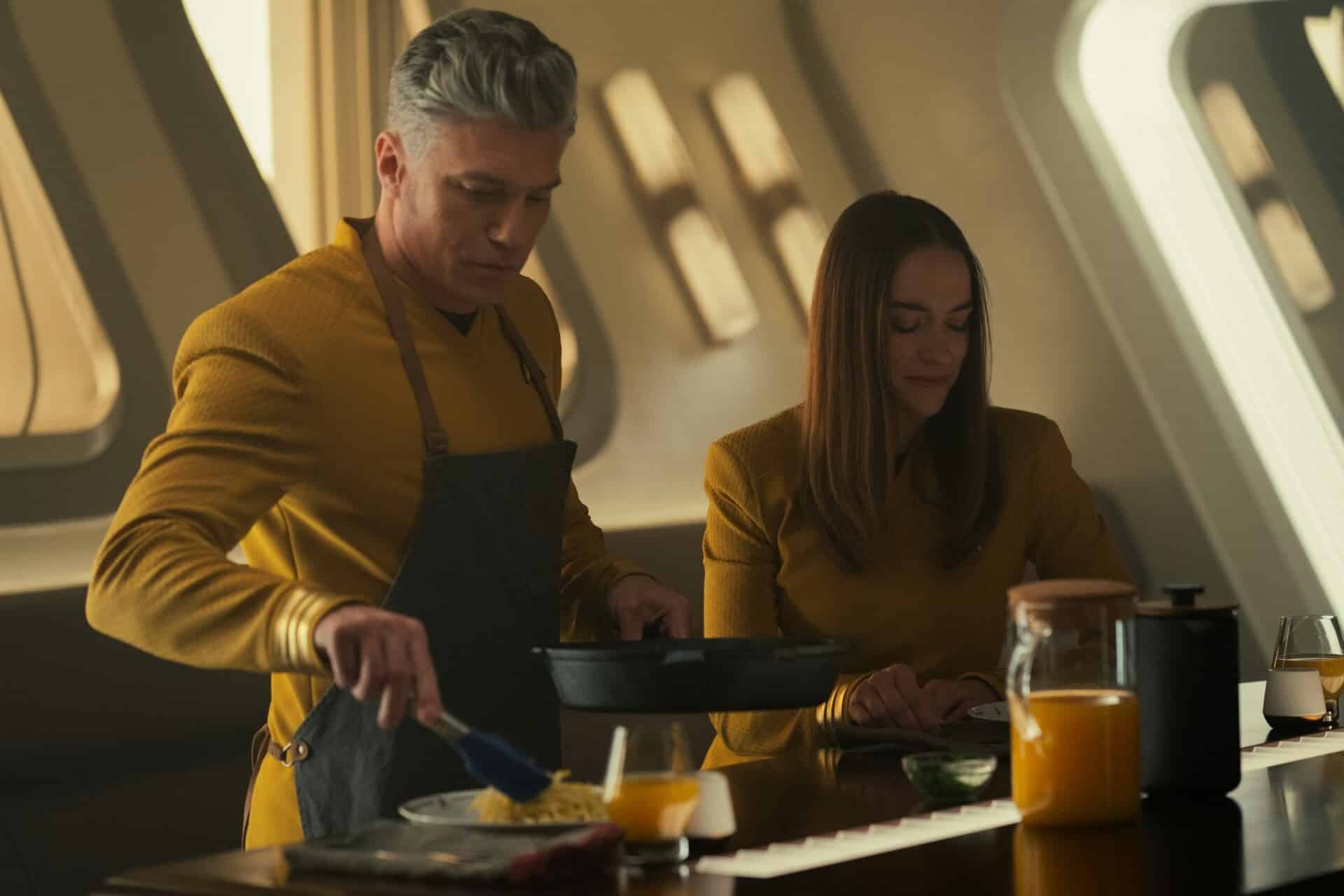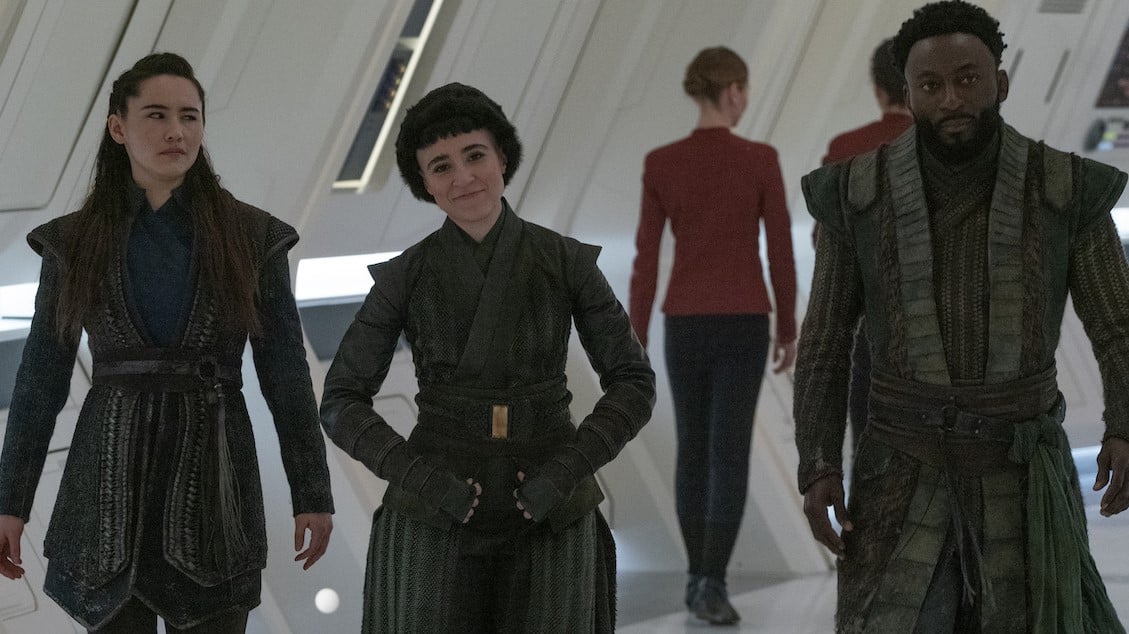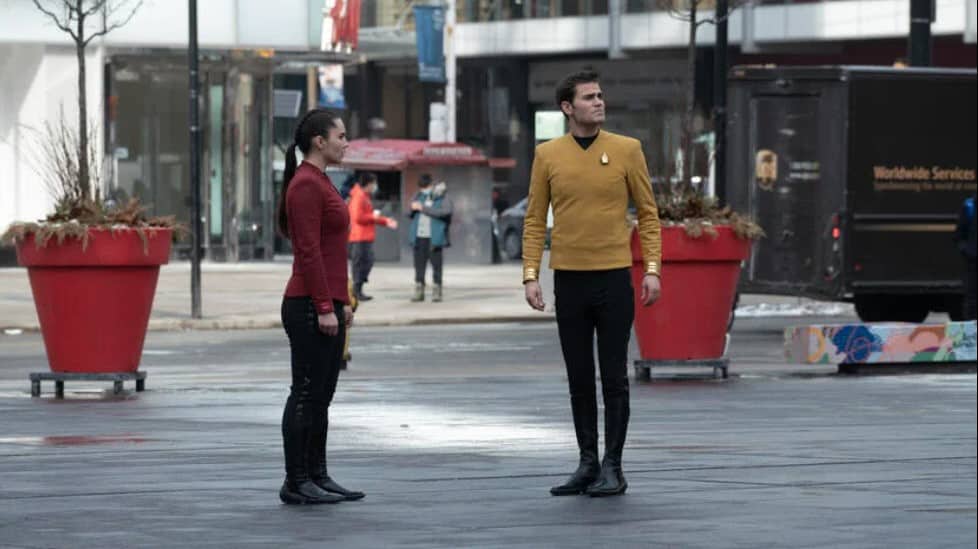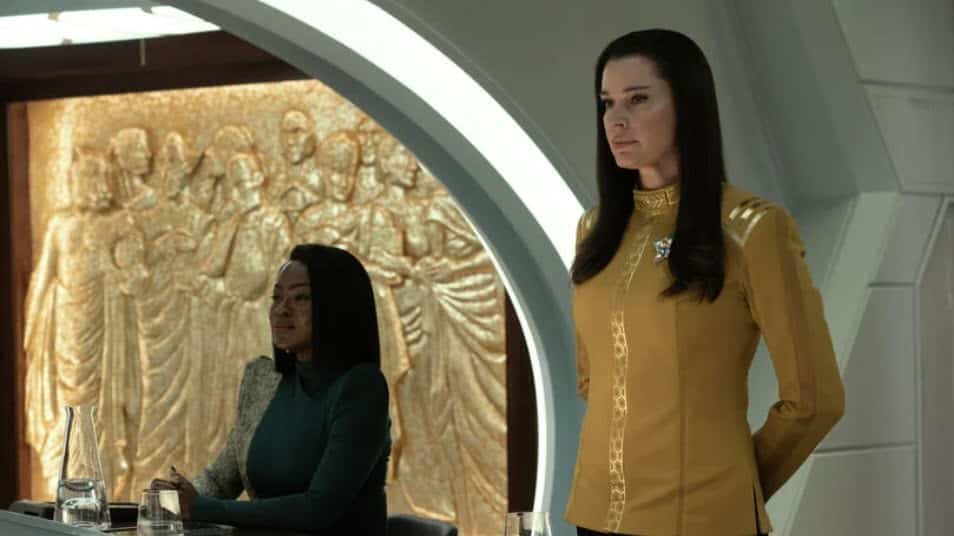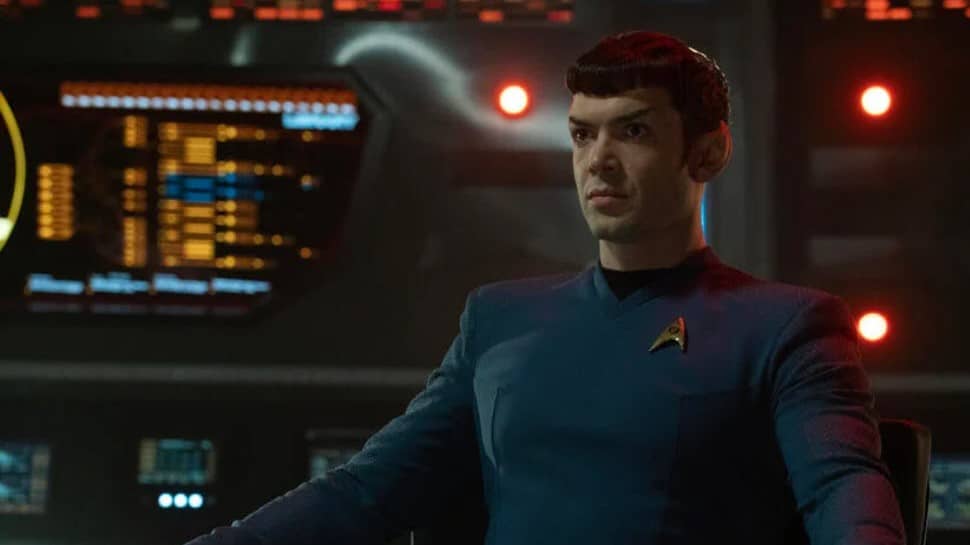Captain Pike is visited by a future version of himself who sends him to an alternate future where he avoids the training accident. While there, Pike brings “A Quality of Mercy” to Romulan provocations near the Neutral Zone. Written by Henry Alonso Myers & Akiva Goldsman, directed by Chris Fisher.
Mark Turetsky: We’ve made it, Will. 19 straight weeks of new Star Trek reviews.
Will Nevin: Aye, that we have. Some have been good; many have been great. But I’m thankful that few — if any — have been downright terrible. And I am especially grateful for the revelation that has been Strange New Worlds. Trek is back in a big way, Mark, and the future looks bright. Unless you’re Chris Pike.
Imbalance of Terror
Mark: I find it amazing: I’ve mentioned “Balance of Terror” at least twice in these reviews, even making reference to the wedding scene that opens it in our review last week. I additionally made a joke about the “quality of mercy” speech from The Merchant of Venice in a Picard review. And here we are, with an episode entitled “A Quality of Mercy,” which presents a Marvel-style “What If” about a timeline where Pike never had the accident and remained the Enterprise captain, opening with that very wedding scene.

Will: A little “What If” crossed with a heavy dose of “Yesterday’s Enterprise.” I’m surprised the seven-years-in-the-future uniforms didn’t come with tactical belts. I said last week that we’d have to have a pretty good episode to justify not ending the season with Hemmer’s death, and despite some misgivings about some of the messages in this story, I think we got there. This was tense and compelling. And the new take on the Wrath of Khan uniforms looked sharp as hell.
Mark: There’s another influence at work here that might not be quite as obvious as “Yesterday’s Enterprise,” and that’s The Twilight Zone. There’s an episode with the exact same title as this, “A Quality of Mercy.” Note that the Shakespeare quote is about “the quality of mercy.”
Setting aside the fact that it has Leonard Nimoy (playing a character named Hansen, no less), this episode features a somewhat similar premise: Dean Stockwell plays a green new lieutenant in the final days of WWII. He’s newly assigned to a worn-down platoon who are stationed near a cave filled with exhausted and injured Japanese soldiers. He orders them to attack the cave, despite a lot of resistance from his soldiers. He then experiences a kind of episode where he finds himself three years earlier, and he’s now a Japanese lieutenant, but he still thinks of himself as the American soldier he was at the beginning of the episode. The roles have also become reversed: his Japanese soldiers are preparing to attack a cave full of exhausted and injured American soldiers.
He has a moral crisis and begs his superior officer not to attack, appealing to their shared humanity. The Japanese officer berates him using the same jingoistic slogans he had been using to motivate his American troops in 1945. He then returns to his present, back into his own self (it’s a kinda Quantum Leap situation), and calls off the attack on the Japanese soldiers. Moments later, they get word that the hydrogen bomb has been dropped on Hiroshima and that the war will be over soon.
Will: Dang it, Mark. I wanted to make the Quantum Leap reference. (RIP, Dean Stockwell.) But in all seriousness, it’s strange that the lesson we’re supposed to take from the Twilight Zone episode is the opposite of what we take here: Rather than Pike’s peacemaker, a pivotal moment in history called for the rash, violent, reactionary move from one James Tiberius Kirk. As far as moral lessons go, I don’t think I cared for that one.
Mark: That’s not precisely what happens in “Balance of Terror,” though. Yes, Kirk fires on the cloaked Romulans, but the episode is much more about the shared respect that Kirk and the Romulan Commander have for one another and humanizing the Romulans. I’d say “Balance” has a lot in common with that Twilight Zone episode as well. The Romulans in “Balance of Terror” are exoticised: they speak in a weird, heightened language, their customs are different, but key to the scenes aboard the Romulan ship are the ways they’re humanized. There’s a great rapport between the (unnamed) Commander and his old battle friend the Centurion.
There’s a similar effect in the Twilight Zone episode, where Dean Stockwell, when he plays the Japanese officer, speaks in an (awful, racist) Japanese accent and even wears yellowface makeup. It… hasn’t aged well, to say the least, but there’s this same idea of exoticising the enemy, and then humanizing them despite or through that exoticisation.
Will: Ooof. Yellowface. It was a…different time. A bad time. But before we go any further, I just want to point out the conclusion I drew last week from the trailer: This was going to be the episode in which Pike determined — once and for all — whether he can escape the accident. And it looks like the answer to that is a big “no.” A hard “no.” A “the galaxy is depending on you almost dying” no.
Mark: It’s funny how much they try to fake us out, too. There are so many moments in this episode where we expect Kirk to die, whether it’s the destruction of the Farragut or the Romulan attack on Kirk’s shuttlecraft, because of course we’re conditioned to think that the fate of the galaxy rests on his shoulders. And it’s not Kirk, not precisely. It’s Spock (which, if you know the behind-the-scenes stories from that cast, would make for the ultimate F-you to William Shatner). What do you think of the idea that the universe will always put someone in that chair, and if it’s not Pike, it’ll be Spock?
Will: In terms of peace with the Romulan Empire, Spock’s centrality makes sense — not only does he attempt the one-man diplomatic mission in “Unification,” but he also flies the Jellyfish himself in an attempt to save the Romulan system. (God, I hate making a Kelvin timeline reference, but I appreciate this episode’s nods toward it.) Spock is also around much longer in the Trek universe than either Pike or Kirk. I guess what I’m saying is that I buy the premise here — although physically and mentally disabling him in the bad timeline was a little hat-on-a-hat-ish when they could have just killed him off.
Mark: Will, you’re not going to believe this, but there’s a Discovery episode in season 3 (when they travel to the 31st Century) called “Unification III,” where we learn about Spock’s legacy. His work leads to the reunification of the Romulans and the Vulcans, and they’re now a shared society living on the planet Ni’Var (which is the planet Vulcan under a new name).
Will: I hated about 35 percent of what you just said there, but I like the core concept.
Mark: So this episode is in conversation with so many different things (there’s even a reference to your hated Kelvin timeline, and by name, even!). Kirk mentions his father’s service on the Kelvin and talks about his next assignment (which I think should lay to rest the persistent idea that NuTrek is somehow set in the Kelvin timeline, which, no it probably won’t: if someone, despite all evidence to the contrary, thought that, this won’t change their mind).
New Kirk, Not The Same As The Old Kirk
Mark: Speaking of Captain Kirk, what did you think of the first appearance of Paul Wesley as Kirk?

Will: I’ve had plenty of dumbassed ideas while watching these shows, but I at no point got the sense this was off in the Kelvin timeline. That thing is off and done for until JJ Abrams decides he wants another crack at making the worst Trek movie imaginable.
But, yes, to your question, I wasn’t impressed by Wesley here. Admittedly, he wasn’t given much beyond the essence of Kirk as an officer (Confrontational! A fighter! Doesn’t take orders well!) but I don’t think he brought much to the character either. Kirk should have some charm to him, some wit. Wesley’s Kirk was a dour space cowboy without the smile, more akin to Ronny Cox’s Captain Edward Jellico than any on-screen Kirk we’ve seen. As much as it pains me (because Bill Shatner is a giant dick), this Kirk is at the bottom of my list. But it’s early.
Mark: I agree. I don’t want a Shatner imitation, I don’t want a Pine imitation, but Wesley needs to bring more to the role than he does here. Still, this is a Kirk who stayed aboard the Farragut and became captain there. It’s an alternate timeline. Hopefully, when Wesley returns as Kirk Prime, he’ll bring some of the charisma that those other two guys brought to the role.
Will: If I got to make the pick in an alternate timeline, you want to know who I would have tapped? Antony Starr. Sure, he’s all over everything right now as Homelander in The Boys, but did you ever see a little Cinemax action series from a few years ago called Banshee? He starred in that as a hard drinkin’, hard fuckin’ Pennsylvania small-town sheriff. He would have killed it as Kirk.
Mark: He might have been good, but he’s far too busy, I’d imagine.
Will: Let me dream, Mark.
Reflections: A Look Back
Mark: Let’s talk about the season as a whole. Now that it’s done, I’m confident in calling this the best first season of a live action Trek series (I’ll still carry a torch for Lower Decks). How about you?

Will: I can only speak to the things I know, and that’s TOS is a scattershot mess for most of its three seasons and that it’s a minor miracle TNG wasn’t canceled after its terrible first. This, however, was a magical 10-episode run with self-contained stories and ones that played out over three or four or five episodes. It was weakest when it aimed for comedy, but even in those soft moments, it was by no means bad. Give Anson Mount all of the awards. And maybe the credit for this working as well as it does.
Mark: I’ll say Deep Space Nine had some interesting ideas in its first season, but is a bit of a mess, and is almost a different show entirely from what it became in later seasons. That’d be the only other first season I’d say comes close.
Despite that praise, I do have some frustrations with the season as a whole: namely, not enough Ortegas (though she got a bit of a spotlight this week, mirroring Lieutenant Stiles’ anti-Romulan xenophobia projected onto Spock) and the somewhat perfunctory role Hemmer played. Still, it offered a wide array of tones, and while it didn’t always hit a touchdown, you could always depend on it to bring home a solid double (take that, sports fans!).
Will: That mixed metaphor was highly illogical, Mark. Feels like a lirpa to my temple.
Mark: It was a goal in one!
Will: Ugh. I think my biggest gripe is the criminal underuse of Una. While that might be rectified in season 2 (or this could be her goodbye!), there’s no excuse for not featuring one of your most interesting characters and the actress behind her.
Mark: Let’s talk about that foreshadowing. We know that Pike was unable to clear Una in this alternate timeline. I can’t help but think a good deal of season 2 will be spent trying to change her fate. I don’t think this is the end of her story, since it was used as the cliffhanger ending to the season. Also, while the Boreth monks might care about Pike trying to avoid the accident, they might not care much about whether Una goes to prison or not.
Will: In the alternate timeline, you gotta wonder how preoccupied Pike was with saving himself as opposed to rescuing Una. I don’t think the character wouldn’t care, but his focus might have been split just enough to the point where she’s off at a Federation penal colony. (Also, the Federation doesn’t let its prisoners communicate with the outside? What the hell?!) Pike is at his best when he’s a negotiator — let’s hope he spends a bunch of time next season arguing in front of stuffy Federation judges.
Mark: We haven’t had any good courtroom episodes this season. Let’s hope for next year!
Will: Oh boy — putting something up there with “The Measure of a Man” and “The Drumhead” would be a boss-level move.
Mark: It would have to jibe with DS9’s “Doctor Bashir, I Presume,” which also deals with a crewmember secretly being genetically enhanced. There’s one thing that gives me pause about Una not returning, and that’s the fact that she’s no longer around during The Original Series and Spock is the first officer in either timeline.
Will: There are holes to fill next season for sure — is Spock the new Number One? What about engineering? And there’s that tantalizing look at a very different La’an. Lots of new directions we could be headed next year.
Stray New Words
- Incidentally, future Pike showing up in the Wrath of Khan-era uniform also puts me in mind of Rod Serling’s iconic, out of place appearances (in another iconic suit) to narrate The Twilight Zone.
- If Pike’s accident happens 6 months before “Balance of Terror,” that means the first 13 episodes of TOS season 1 happen in that time (7 episodes if we’re going by production order). Interestingly, that means that the events of “The Menagerie” happen within 6 months of Pike’s accident, meaning Pike’s disability lasts less than 6 months before returning to Talos, where he lives in an illusion of being able bodied with a woman he loves.
- We theorized last week about Uhura possibly not remaining on the Enterprise. She does show up in the penultimate sequence on the bridge, but curiously does not appear in any wide shots. I wonder if these insert shots of Uhura were filmed later on.
- Scotty appearing only in voice suggests either they’re not ready to cast the character or they’re not ready to announce the casting. Perhaps not even ready (or willing) to bring the character into the series.
- The producers have stated in interviews that the new engineer will not be Scotty. [MT]
- La’an was presumably Kirk’s first officer. That would be a fun dynamic to have explored.
- “The quality of mercy is not strained;
It droppeth as the gentle rain from heaven
Upon the place beneath. It is twice blest;
It blesseth him that gives and him that takes”
– The Merchant of Venice, IV i

